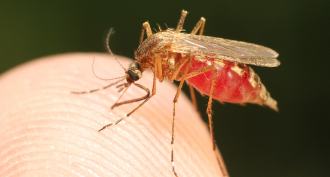Humans
-
 Psychology
PsychologyPhones in the classroom hurt everyone’s grades
When students use electronic devices in the classroom, their school performance may suffer. And so might their classmates’ grades, a new study finds.
-
 Animals
AnimalsCool Jobs: Sucking up science with mosquitoes
Mosquitoes are tiny, but the illnesses they spread can be deadly. To fight these germ spreaders, scientists need to get to know mosquitoes better — much better.
-
 Brain
BrainBody heat due to exercise may reduce hunger
Why aren’t animals hungry after a workout? Brain cells that control appetite may sense the exercise heat — and keep you out of the kitchen, a new study finds.
-
 Health & Medicine
Health & MedicineGut ‘bug’ transplants can bring kids with autism lasting benefits
Giving fecal transplants to kids with autism helped their stomach symptoms and behavioral symptoms — even two years after the poop trade.
-
 Health & Medicine
Health & MedicineExplainer: What is a clinical trial?
Scientists perform these to compare the effects of a new drug or therapy in treated — and untreated — people. Always people.
-
 Archaeology
ArchaeologyCremated remains hint at who was buried at Stonehenge
A chemical analysis shows that people carried bodies from far away to be buried at the mysterious ancient monument known as Stonehenge.
By Bruce Bower -
 Brain
BrainSoccer headers may hurt women’s brains more than men’s
Women sustain more brain damage from heading soccer balls than men, a new imaging study indicates.
-
 Psychology
PsychologyAre you scared of heights? Virtual reality could help
Virtual reality may help people battle a real-world fear of heights.
-
 Health & Medicine
Health & MedicineScientists Say: Remission
Remission is a term used in medicine. It describes a disease that isn’t active anymore —whether it is cured or simply dormant.
-
 Health & Medicine
Health & MedicineTaste good? Senses inform the brain — but don’t tell everyone the same thing
Whether something tastes appetizing depends on what a host of different sensory nerves collectively tell the brain. Warning: Sometimes they aren’t dependable — or even truthful.
By Lela Nargi -
 Health & Medicine
Health & MedicineExplainer: Taste and flavor are not the same
What’s behind a food’s flavor? More than what we taste, it turns out.
By Lela Nargi -
 Animals
AnimalsHere’s how a clam can hide within a rock
Old boring clam research has been upended after 82 years.
By Susan Milius